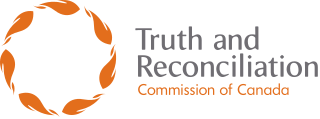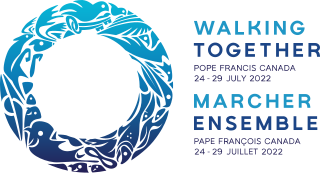
The CanadianIndian residential school system was a network of boarding schools for Indigenous peoples. The network was funded by the Canadian government's Department of Indian Affairs and administered by Christian churches. The school system was created to isolate Indigenous children from the influence of their own culture and religion in order to assimilate them into the dominant Canadian culture. Over the course of the system's more than hundred-year existence, around 150,000 children were placed in residential schools nationally. By the 1930s, about 30 percent of Indigenous children were attending residential schools. The number of school-related deaths remains unknown due to incomplete records. Estimates range from 3,200 to over 30,000, mostly from disease.

William Frederick Allen Phipps was a Canadian ordained minister of the United Church of Canada, lawyer and social activist. He served as the 36th Moderator of the United Church of Canada from 1997 to 2000, and engendered controversy for expressing support for gay ordination and not believing in a physical Resurrection of Jesus.
First Nations in Alberta are a group of people who live in the Canadian province of Alberta. The First Nations are peoples recognized as Indigenous peoples or Plains Indians in Canada excluding the Inuit and the Métis. According to the 2011 Census, a population of 116,670 Albertans self-identified as First Nations. Specifically there were 96,730 First Nations people with registered Indian Status and 19,945 First Nations people without registered Indian Status. Alberta has the third largest First Nations population among the provinces and territories. From this total population, 47.3% of the population lives on an Indian reserve and the other 52.7% live in urban centres. According to the 2011 Census, the First Nations population in Edmonton totalled at 31,780, which is the second highest for any city in Canada. The First Nations population in Calgary, in reference to the 2011 Census, totalled at 17,040. There are 48 First Nations or "bands" in Alberta, belonging to nine different ethnic groups or "tribes" based on their ancestral languages.

The Midewiwin or the Grand Medicine Society is a secretive religion of some of the Indigenous peoples of the Maritimes, New England and Great Lakes regions in North America. Its practitioners are called Midew, and the practices of Midewiwin are referred to as Mide. Occasionally, male Midew are called Midewinini, which is sometimes translated into English as "medicine man".
Thelma J. Chalifoux was a Canadian teacher and senator.

The Truth and Reconciliation Commission of Canada was a truth and reconciliation commission active in Canada from 2008 to 2015, organized by the parties of the Indian Residential Schools Settlement Agreement.

Suzette Mayr is a Canadian novelist who has written five critically acclaimed novels. Currently a professor at the University of Calgary's Faculty of Arts, Mayr's works have both won and been nominated for several literary awards.
The Sixties Scoop, also known as The Scoop, was a period in which a series of policies were enacted in Canada that enabled child welfare authorities to take, or "scoop up," Indigenous children from their families and communities for placement in foster homes, from which they would be adopted by white families. Despite its name referencing the 1960s, the Sixties Scoop began in the mid-to-late 1950s and persisted into the 1980s.

Richard Wagamese was an Ojibwe Canadian author and journalist from the Wabaseemoong Independent Nations in Northwestern Ontario. He was best known for his novel Indian Horse (2012), which won the Burt Award for First Nations, Métis and Inuit Literature in 2013, and was a competing title in the 2013 edition of Canada Reads.

The Tar Sands Healing Walk was a 14 km annual prayer walk in demonstration against crude oil extraction in the Athabasca tar sands. It began in 2010, starting just north of the city of Fort McMurray, Alberta at a location known as the Syncrude Loop, and traveling through the heart of the tar sands extraction zone. The walk was led by local Indigenous Elders, who prayed for the healing of the land and to bring attention to the destructive impacts of the tar sands.
Ruth Cuthand D.F.A. is a Canadian artist of Plains Cree and Scots ancestry. She is considered an influential feminist artist of the Canadian prairies, and is lauded for her interpretation of racism and colonialism. Her work challenges mainstream perspectives on colonialism and the relationships between settlers and Indigenous people in a practice marked by political invective, humour, and a deliberate crudeness of style.
A healing lodge is a Canadian correctional institution designed to meet the needs of Aboriginal inmates. Healing lodges were created to address the concern that traditional prisons do not work on aboriginal offenders. Aboriginals are over-represented in the prison system and are also more likely to be the victims of crime. In healing lodges, the focus is on healing and reconnecting with indigenous culture while inmates serve their sentences. Connecting to nature, participating in cultural ceremonies, and learning spiritual teachings are how Healing Lodges process the rehabilitation and healing of inmates. They also have access to spiritual guidance from Elders and are encouraged to maintain connections with their families and communities. Healing lodges were proposed as an alternative for Aboriginal female offenders, but there are now healing lodges for Aboriginal male offenders as well. Women's healing lodges are minimum/medium-security facilities, and men's healing lodges are minimum-security facilities.
Indigenous peoples of Canada are culturally diverse. Each group has its own literature, language and culture. The term "Indigenous literature" therefore can be misleading. As writer Jeannette Armstrong states in one interview, "I would stay away from the idea of "Native" literature, there is no such thing. There is Mohawk literature, there is Okanagan literature, but there is no generic Native in Canada".

Rajan Sawhney is a Canadian politician from the United Conservative Party in Alberta. She was elected in the 2019 Alberta general election to represent the electoral district of Calgary-North East in the 30th Alberta Legislature. On April 30, 2019, she was appointed to be the Minister of Community & Social Services in the Executive Council of Alberta. On July 8, 2021, she was shuffled into the Minister of Transportation.

Lana Whiskeyjack is a multidisciplinary artist, writer and researcher known for her work exploring experiences of Cree identity in Western culture. She is featured in the documentary film Lana Gets Her Talk by Beth Wishart MacKenzie.
Lillian Shirt was a Cree women's rights activist from Saddle Lake Cree Nation in Treaty 6 Territory, Alberta, Canada who was known for her political initiative against the discrimination towards Indigenous women and their inadequate access to housing, employment, and human rights.
Red Dress Day, or Red Dress Campaign, is an annual event held by the REDress Project in memory of the lives of Missing and Murdered Indigenous Women and Girls across Canada. This event was originally held on May 5, 2010, and continues annually. The event is sometimes held on other dates throughout the year to coincide with other days of action, such as National Indigenous Peoples Day. Associated names with this event include National Day of Awareness For Missing and Murdered Indigenous Women And Girls. Red Dress Day is one of several campaigns started by activists to call attention to disproportionate rates of violence against Indigenous women.

Maggie Black Kettle was a Canadian community leader in the Siksika Nation. She taught traditional crafts, dance, and the Blackfoot language in Calgary. She was a storyteller, and appeared in film and television programs in her later years.
Jenny Margetts, born Jane Maria Shirt, was an Indigenous woman who advocated for women and children. She was born to Felix and Louisa Doghead Shirt on the Saddle Lake Reserve in Alberta, Canada. Growing up in a family of ten, she attended Blue Quills Indian Residential School for nine years. Following graduation from Victoria Composite High School in Edmonton, Alberta. she decided to enter the Dominican Order. Jenny traveled with Bishop Lussier by train and arrived in Quebec City, Quebec on April 22, 1954. After six months as a postulant she became a novice and chose the name Louisa in honor of her mother. Sister Louisa spent the next two years in religious formation, learning French. Shortly after taking her First Vows returned to Saddle Lake to work in a newly established mission. She told of having a dream of a man crying, and her phoning home to Saddle Lake, and being told, “Come back. You do not belong there. We need you here.” During this period, she decided the religious life was not for her, and left the Order in June 1957. She remembered taking a social justice course from a priest who told her that even one person who is concerned can make changes. Three years later she married, started a family, and became an activist for Indigenous women and children.

Pope Francis visited Canada from July 24 to 29, 2022, with stops in the provinces of Alberta and Quebec and the territory of Nunavut. The trip mainly focused on apologizing for the Catholic Church's role in the Canadian Indian residential school system and reconciliation with the country's Indigenous peoples. It was the first papal visit to Canada since 2002, when Pope John Paul II visited Toronto for World Youth Day.










